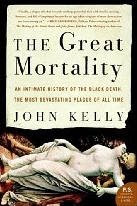Lancaster and York by Alison Weir
 In the fifteenth century hostilities broke out among the highest echelons of English society. The House of York and the House of Lancaster, rival factions of the royal family, fought for the crown while the common people carried on as usual and fled as necessary. As Henry VI and his wife, Margaret of Anjou, battled two successive Dukes of York, a situation was created in which families were divided, loyalties were variable, and a single decision could change the course of history or cost you your life - or both.
In the fifteenth century hostilities broke out among the highest echelons of English society. The House of York and the House of Lancaster, rival factions of the royal family, fought for the crown while the common people carried on as usual and fled as necessary. As Henry VI and his wife, Margaret of Anjou, battled two successive Dukes of York, a situation was created in which families were divided, loyalties were variable, and a single decision could change the course of history or cost you your life - or both.
I’m ashamed to admit that when I was studying Richard III in Year 10 English, I’d barely even heard of the Wars of the Roses. (Isn’t modern education wonderful?) Now I’m fascinated, and books like this will show you why - a mix of powerful personalities engaged in endless political and military manoeuvring, plus some fabulously strong women. It doesn’t cover the rise of the Tudors, but it provides a comprehensive and readable history of the first period of the wars when the Yorkists’ opponents were the legitimate branches of the House of Lancaster. It also details the decades leading up to the outbreak of fighting, during which the basis for the dispute was laid - the reign of Richard II, his overthrow by Henry IV, and finally the change in attitude of Richard Duke of York from merely wanting to curb the power of Henry VI’s profligate favourites to believing he ought to be king himself.
I’ve come to see Margaret of Anjou in a slightly different light. She’s still one of the historical figures I love to hate; but now I can also pity and admire her. It can’t have been easy to become queen of a foreign country at such a young age, or for such a formidable woman to be tied to such a mousy husband. In a world dominated by men, she raised and led armies in support of first her husband, then her son. And in the end she lost everything she cared for - her husband murdered in the tower, her son murdered on the battlefield, her hated enemy’s son wearing the crown.
Rating: A
The Sisters Who Would Be Queen by Leanda de Lisle
 The three Grey sisters - Jane, Katherine and Mary - shared the blood of the royal house of Tudor, and hence a claim to the throne. Jane’s came to an end on the scaffold after just nine days as queen, but those of her sisters remained. And it was under the rule of Elizabeth that they suffered the most for this accident of birth. In the eyes of Tudor England, a female ruler was against nature and against God. Far better a female claimant with the backing of a capable husband; better yet a male descendant of the Tudors. As long as the Grey sisters remained unwed, they posed no threat - but when they insisted on following their hearts they were imprisoned by a queen who could not afford to risk jeopardising her hold on power.
The three Grey sisters - Jane, Katherine and Mary - shared the blood of the royal house of Tudor, and hence a claim to the throne. Jane’s came to an end on the scaffold after just nine days as queen, but those of her sisters remained. And it was under the rule of Elizabeth that they suffered the most for this accident of birth. In the eyes of Tudor England, a female ruler was against nature and against God. Far better a female claimant with the backing of a capable husband; better yet a male descendant of the Tudors. As long as the Grey sisters remained unwed, they posed no threat - but when they insisted on following their hearts they were imprisoned by a queen who could not afford to risk jeopardising her hold on power.
I like to think of myself as reasonably well-versed in history, but all I knew of the younger Grey sisters was that they existed. Now those bare names have been transformed into distinct personalities and memorable stories. And Jane is here presented as an intelligent, determined young woman rater than the tragic pawn of later popular imagination. Indeed the most tragic of the three is Katherine, who possibly starved herself to death rather than endure a life of captivity far away from her beloved husband. Mary was my favourite, shrewd enough to navigate the dangerous waters of the court for years before her mistake, and able to find some measure of happiness in the end.
It occurred to me that the fate of the younger Grey sisters is another argument against the theory of Richard III’s responsibility for the disappearance of his nephews. If a woman’s claim to the throne could be adopted as his own by a sufficiently ambitious husband, if her son could form the figurehead of a rebellion, if these threats were real enough for a monarch to take drastic steps to prevent them - why, if he were guilty, did Richard not get rid of his nieces as well?
Rating: A






